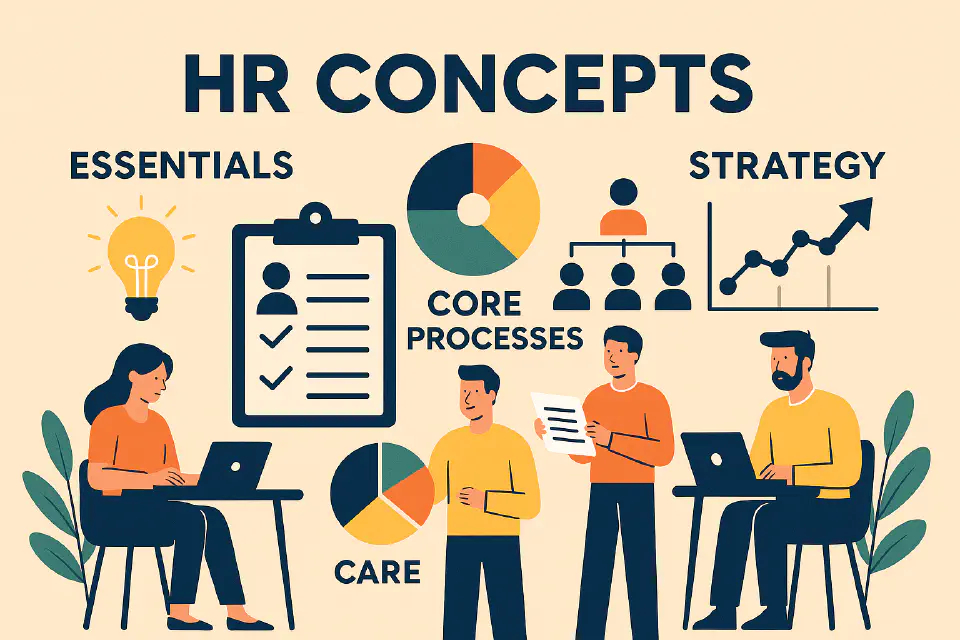
HRM Guide
Welcome to HRM Guide — your trusted source for clear, comprehensive, and practical insights into the world of Human Resource Management. Whether you're an HR professional, business leader, startup founder, or curious learner, this site offers expert guidance across every major area of modern HR — from foundational principles to advanced strategies and global best practices.
Human Resources today is no longer just about payroll and hiring. It is a strategic enabler of business success, culture, innovation, and resilience. The HRM Guide is designed to reflect that shift — giving you not just information, but usable knowledge.
What is Human Resource Management (HRM)?
Human Resource Management (HRM) is the discipline focused on managing people in organizations in a way that enhances performance, ensures legal compliance, supports employee wellbeing, and builds a sustainable competitive advantage. It encompasses both administrative responsibilities and strategic leadership.
From workforce planning and employee experience to leadership development and digital HR tools, HRM spans a wide spectrum of practices, competencies, and disciplines. And understanding how they connect — strategically — is what this guide is all about.
HR Essentials: The Foundation of Every HR Strategy
Our HR Essentials section is your starting point. It covers the core concepts, roles, and regulatory frameworks that every HR function builds on:
- What is HR? introduces key theories and models like the Harvard Model, Fombrun, and Resource-Based View.
- HR Roles & Responsibilities explains the difference between HRBPs, generalists, specialists, and strategic partners.
- Employee Lifecycle offers a structured view across hiring, onboarding, development, and exit.
- Employment Types, Compliance & Ethics, and Workplace Safety give you the legal and ethical grounding required to operate HR responsibly.
HR Strategy & Organization: Building HR as a Strategic Partner
The strategic value of HR lies in its ability to shape organizational capabilities. Our HR Strategy & Organization section explores:
- Crafting long-term HR Strategies aligned with business goals
- Leading HR Transformation initiatives and enabling change
- Designing effective HR Operating Models (Ulrich, Agile, HR-as-a-Service)
- Structuring your HR Organization & Leadership to support growth
- Mastering Workforce Planning, Skills-based Organization and ESG-driven HR
This section is especially useful for HR leaders, senior managers, and transformation teams.
Core HR Processes: Operational Excellence, Strategically Delivered
HR’s credibility depends on its ability to execute flawlessly. The Core HR Processes section breaks down each functional area:
- Recruitment & Talent Acquisition
- Performance Management and Learning & Development
- Compensation & Benefits, Engagement, Onboarding, and Offboarding
- Diversity, Equity & Inclusion, Internal Mobility, Employee Relations
Whether you’re revising a policy, launching a new program, or handling complex people issues — this is your operational toolkit.
Digital HR & Tools: The Tech That Powers Modern HR
Technology is now embedded in every part of the employee journey. The Digital HR & Tools section helps you:
- Compare HRIS, ATS, and LMS platforms
- Implement People Analytics and HR Automation
- Understand the impact of AI in HR and ethical concerns
- Create dashboards, KPIs, and automation flows
This section is ideal for HR technologists, analysts, and HR leaders integrating tech into strategy.
Culture & Experience: From EX to Wellbeing and Agility
Modern HR is inseparable from culture and employee experience. This section connects behavioral science, communication, and wellbeing to strategic HR goals:
- Crafting Employee Experience (EX) across the journey
- Building a culture of Belonging, Motivation, and Psychological Safety
- Supporting Remote & Hybrid Work, Internal Communication, and Innovation
- Applying Behavioral Science and tracking People Productivity
This is the heart of human-centered HR — and a key to both retention and performance.
Global HR: Managing Complexity Across Borders
For organizations operating internationally, Global HR brings its own set of challenges and requirements:
- Hiring & managing in different countries
- Navigating Global Payroll, Relocation, and Compliance
- Building culturally sensitive policies
- Managing distributed teams
Whether you’re a global HRBP, local HR manager, or setting up your first international hire — this section prepares you for compliance, consistency, and agility.
Library & Resources: Templates, Tools, and Real Stories
The Library is your companion space — packed with:
- Downloadable Templates and Policies
- Articles, Case Studies, and benchmarking data
- A complete HR Glossary and FAQ
Use this section as your go-to reference when you need examples, real-world practices, or to brush up on terminology.
Why HRM Guide?
Because HR deserves a better knowledge experience.
- No jargon. No vague advice.
- Just structured, expert-driven content.
- Practical enough for startups, deep enough for HR leaders.
Our content is crafted by experienced HR professionals, reviewed for clarity and relevance, and continuously updated. Whether you’re scaling your first HR process or redesigning your org model, HRM Guide meets you where you are.
Ready to Explore?
Dive into any section, bookmark your favorites, and use the guide as your everyday reference.
👉 Start with HR Essentials if you’re new to HR, or jump to Strategy & Organization if you’re planning transformation.
Together, let’s make HR more strategic, human, and impactful.